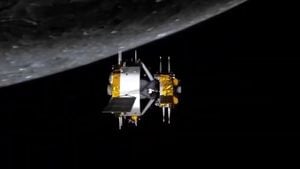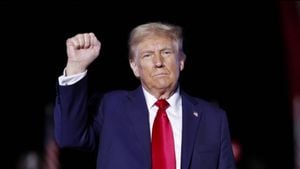The return of Donald Trump to the presidency has sparked widespread speculation about the ramifications for Middle Eastern policy, particularly following his recent electoral victory over Vice President Kamala Harris.
Trump's first term saw significant developments, such as the Abraham Accords, which facilitated normalization between Israel and several Arab nations, including the United Arab Emirates and Bahrain. With the geopolitical climate remaining tense, the focus now shifts to how his administration intends to navigate the complicated web of relationships and conflicts, especially amid the Israeli-Hamas war.
Political analysts and former diplomats are closely observing how Trump's policies may differ from those of President Biden and how they might affect the region. The turmoil feels palpable, as key players from Israel to Iran assess the incoming administration's direction. The possibility of Trump prioritizing Saudi Arabia as his first overseas trip, mirroring his 2017 visit, raises eyebrows. Many speculate he may push for more deals similar to the Abraham Accords.
Experts predict his foreign policy could be even less restrained than during his first term, intensifying support for Israel at the expense of Palestinian concerns. Last month, Israeli Prime Minister Benjamin Netanyahu hailed Trump’s victory, viewing it as validation for the right-wing policies he has championed.
Yet, Trump's background as a self-proclaimed dealmaker does not guarantee straightforward resolutions. The devastation wrought by the conflict, which has increased military tensions and the suffering of civilians, may complicate diplomatic endeavors.
A potential shift is on the horizon as Trump is expected to nominate individuals aligned with militaristic and pro-Israel beliefs for key positions within his cabinet. Notably, his son-in-law Jared Kushner is anticipated to maintain influence on Middle Eastern matters, even without holding formal office. Diplomats regard Kushner's established relationships with regional leaders as immensely valuable, potentially easing the administration’s navigation of existing conflicts.
It’s important, too, to note the deep-seated tensions between the Republican party's factions. While some member factions lean toward isolationism, the dominant view aligns more with interventionism and active engagement, particularly emphasized during times of crisis. This jumbled political spectrum may yield unpredictable yet consequential outcomes.
Experts have raised alarms about the Trump administration reinstigated support for regimes opposed to democratization and human rights. Nader Hashemi, director of the Alwaleed Center for Muslim-Christian Understanding, argued Trump's second term would inevitably lead to increased instability across the region and bolster radical extremism due to the neglect of the systemic issues plaguing Middle Eastern countries.
Meanwhile, Trump's approach to Iran remains of acute interest. The tentative relationship with Tehran raises questions about the future of the Joint Comprehensive Plan of Action (JCPOA). On the campaign trail, Trump suggested he might be open to renegotiation, depending heavily on the threats posed by Iran’s actions and aspirations about nuclear capability.
The aggressive stances taken by the Israeli regime could escalate tension with Iran. Tehran's officials, for their part, indicate cautious willingness to engage diplomatically, provided they are approached with respect—highlighting the importance of nuanced diplomatic relations moving forward.
With Chinese influence looming large over Middle Eastern dynamics, discussions about competing power structures create another layer of complexity to U.S. involvement. Increased engagement from Asian powers could reshape existing alliances and influence the U.S.'s standing within the region.
All told, Trump's eagerness to resume tackling Middle Eastern ties—likely by capitalizing on past relationships—indicates continuity from his first term's approach. Indications point to strategic maneuvers emphasizing America’s role as the primary broker and influencer, addressed through the lens of security and economic stability.
Caught between activism and isolationism, Trump’s administration is set to influence conditions not just for the Middle East, but possibly, through emulation or reaction, on the global stage.
Trump’s policies may resonate deeply with regional autocratic leaders, emboldening military actions under the pretext of restoring order and peace, even as humanitarian crises proliferate. Experts remain attentive to these developments, presaging tumultuous interactions marked by both renewed cooperation and heightened conflict.
Whether the ambitions of Trump 2.0 will translate to tangible benefits for the Middle East remains to be seen, but one fact is clear: the political chess match awaits, with every player poised to take action based on the previous moves.



